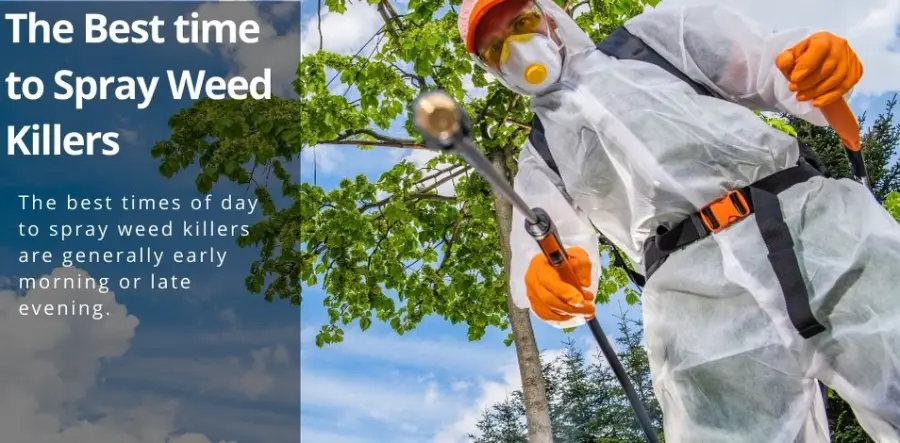It’s a common question for gardeners and lawn caretakers: is it better to spray weed killer before or after mowing the lawn? Unfortunately, there’s no easy answer. It depends on the type of weeds you’re dealing with, as well as the products you’re using.
For most common lawn weeds, such as dandelions and clover, it’s best to spray them after mowing. This gives the weed killer a chance to penetrate the plant’s leaves and enter its system.
However, there are some exceptions. If you’re dealing with difficult-to-kill weeds like creeping Charlie or ground ivy, you may need to spray them before mowing. This will help to ensure that the weed killer comes into contact with all parts of the plant.
No matter when you spray, be sure to follow the instructions on the product label carefully. This will help you to avoid damaging your green lawn or harming yourself and others.
Table of Contents
Toggle3 reasons why you should wait for spraying weeds until after you’ve mowed:
1. The herbicide will have a chance to enter the soil and roots, which will help to prevent the plant from regrowing.
2. You won’t have to worry about the weed killer getting on your clothes or skin.
3. The herbicide will be less likely to evaporate in the heat of the day.
Ultimately, the decision of when to spray weeds is up to you. Just be sure to follow the instructions on the product label carefully, and consider the type of weeds you’re dealing with. With a little trial and error, you’ll be able to find the best time to spray for your particular situation.
5 reasons why you should spray weeds before mowing:
1. It’s easier to see the weeds when they’re not hidden by tall grass.
2. The weed killer will have a chance to penetrate the plant’s leaves and enter its system.
3. You’ll be able to get rid of the entire plant, rather than just the top growth.
4. Smaller plants are easier to kill than larger ones.
5. You won’t have to worry about the weed killer damaging your lawn mower.
Before you reach for the weed killer, try pulling the weeds by hand. This is the best way to get rid of them, and it’s much better for the environment.
How Soon After Spraying Weeds Can I Mow?
It’s best to wait at least 24 hours after spraying weed killer before mowing your lawn. This will give the product time to work and prevent you from damaging your lawn mower.
If you need to mow sooner than that, be sure to wear long pants and a long-sleeved shirt to protect your skin from the weed killer. You should also avoid walking on the treated area until it’s completely dry.
Weed killers are an important part of keeping your lawn looking its best. By following these tips, you can be sure that you’re using them in the most effective way possible.
Can I Spray the Weeds After Mowing?
Yes, in most cases you can – and should – spray the weeds after mowing. This is because many weed killers need to be absorbed by the leaves in order to be effective. When you mow the lawn, you cut off the tops of the weeds. This exposes their leaves, which makes it easier for the herbicide to penetrate them.
Can I Spray the Weeds in the Rain?
No, you should not spray the weeds in the rain. This is because many weed killers are designed to evaporate quickly. If it rains, the chemical may wash away before it has a chance to work.
Should you cut grass before applying weed killer?
It’s best to wait until after mowing your lawn before spraying weed killer. This will help to ensure that the product comes into contact with all parts of the plant.
When should I spray for weeds?
It depends on the type of weeds you’re dealing with, as well as the products you’re using. For most common lawn weeds, such as dandelions and clover, it’s best to spray them after mowing. This gives the herbicide a chance to penetrate the plant’s leaves and enter its system.
However, there are some exceptions. If you’re dealing with difficult-to-kill weeds like creeping Charlie or ground ivy, you may need to spray them before mowing. This will help to ensure that the herbicide comes into contact with all parts of the plant.
The best time to spray is early in the morning before the sun gets too hot and the wind starts to blow. You don’t want the liquid herbicide to evaporate before it has a chance to work.
You should also avoid spraying on days when it’s going to rain. The rain will wash away the chemical, and you’ll just end up wasting your time and money.
Should you Mow Your Lawn Before or After a Lawn Treatment?
Just like with weed killers, there is no one-size-fits-all answer to this question. It depends on the type of lawn treatment you’re using and the condition of your lawn.
If you’re doing a simple fertilization or weed control treatment, it’s usually best to mow first. This will help the product to penetrate the grass and be more effective.
But if you’re doing a deep-root feeding or other types of treatment that requires the grass to be dry, you should mow after the lawn treatments have had time to soak in.
A healthy lawn is a key to a beautiful yard.
By following these tips, you can be sure that you’re using your lawn treatments in the most effective way possible.
10x for reading!
![]()
















